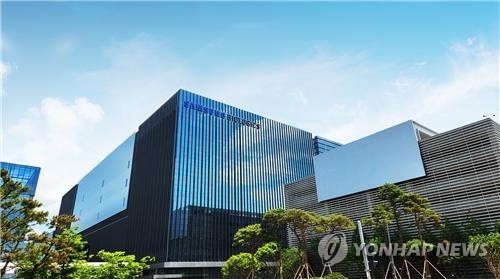- California Assembly OKs highest minimum wage in nation
- S. Korea unveils first graphic cigarette warnings
- US joins with South Korea, Japan in bid to deter North Korea
- LPGA golfer Chun In-gee finally back in action
- S. Korea won’t be top seed in final World Cup qualification round
- US men’s soccer misses 2nd straight Olympics
- US back on track in qualifying with 4-0 win over Guatemala
- High-intensity workout injuries spawn cottage industry
- CDC expands range of Zika mosquitoes into parts of Northeast
- Who knew? ‘The Walking Dead’ is helping families connect
Samsung Biologics plans to set up holding company to separate CDMO, biosimilar biz
Samsung Biologics Co., a biotech arm of South Korea’s Samsung Group, said Thursday it plans to spin off its biosimilar development business to streamline its operations and focus on its core contract development and manufacturing organization (CDMO) services.
According to a regulatory filing, the company will establish a new entity, Samsung Epis Holdings, which will later incorporate Samsung Bioepis Co., a biosimilar drug developer, as a wholly owned subsidiary.
The spinoff process will proceed with the submission of a securities report on July 29, followed by a shareholders meeting on Sept. 16 for final approval.
Samsung Biologics explained that the split will allow the company to concentrate resources on its CDMO business, which operates under a different revenue model compared to biosimilars.
CDMO refers to a company that handles not only the outsourced manufacturing of drug substances but also all of the innovation and development work that occurs prior to production.
Samsung Biologics said the move is aimed not only at improving operational focus, but also at addressing concerns from CDMO clients about potential conflicts of interest.
In particular, the company acknowledged that some customers have raised concerns over the possibility that proprietary technologies for original drugs might be shared with Samsung Bioepis, which operates in the biosimilar space.
“As Samsung Bioepis has been expanding its biosimilar business, the concerns of Samsung Biologics’ customers have gradually increased, which has had some impact on the competitiveness of our orders,” said Ryu Seung-ho, chief financial officer at Samsung Biologics, during an online briefing.
“After the separation, we expect our customers’ concerns about conflicts of interest will be better addressed.”
Samsung Biologics originally established Samsung Bioepis as a joint venture with U.S. pharmaceutical company Biogen Inc. in 2012. It acquired Biogen’s stake for US$2.3 billion in 2022, making Bioepis a wholly owned subsidiary.
Ryu also emphasized that the spinoff is not part of any broader corporate governance restructuring within Samsung Group.
In a separate statement, Samsung Bioepis said the spinoff will not impact its day-to-day operations.
“Samsung Bioepis’ ongoing business operations, including research and development, manufacturing, supply distribution and commercialization of biologic medicines, will not be affected by the spinoff,” the company said.
“We will continue to focus on our core business, and we remain committed to ensuring the continued development, manufacturing and distribution of high-quality biosimilar medicines to patients around the world without any disruption.”
By separating the two businesses, Samsung Biologics said it aims to reinforce the independence of both entities, allowing each to sharpen its strategic focus. The company said this will enhance competitiveness, operational efficiency and long-term value for shareholders.
Samsung Biologics is one of the world’s leading CDMO firms, reporting 4.54 trillion won ($3.3 billion) in sales and 1 trillion won in net profit in 2024.
Shares of Samsung Biologics fell 1.82 percent to close at 1.08 million won on the Seoul bourse, underperforming the broader Korea Composite Stock Price Index’s 1.22 percent drop. The spinoff plan was announced before the market opened.













